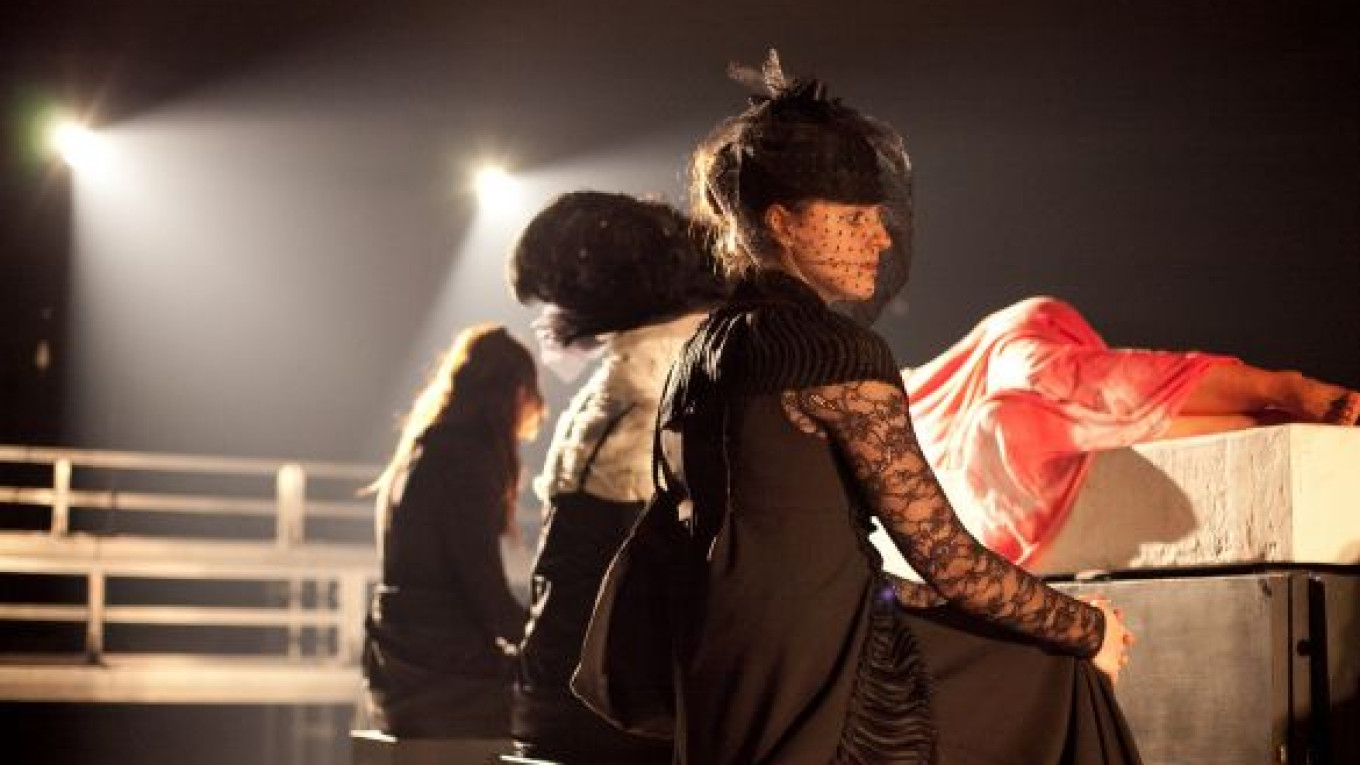Carlo Gozzi. The famous 18th-century Italian writer of colorful, slightly unsettling fairy tales. In theater it has come precariously close to cliche. You stage Gozzi in extravagant costumes of vibrant color, usually showing a prominent Oriental influence.
That is, unless you are Nikolai Roshchin and you do it at Moscow's ARTO Theater.
Roshchin's newest production is Gozzi's "The Raven," and I wager it is unlike any Gozzi done before. It is black, white and severe. It is almost an angry show. No, I think we can dispense with "almost." There is something about this "Raven" that reminds me of the proverbial madman on the bridge, haranguing passers-by with the unwanted news that the world is coming to an end.
Don't get me wrong. There is plenty of humor in this rendition of a play about two royal brothers who make such a mess of their kingdom that everybody in it who doesn't die prepares to flee.
Now pardon my being so literal, but I cannot fail to make this observation: As heated commentary surrounding recent Duma elections in Russia continues to rage, and as we prepare for the eventuality in March that one Russian politician will amiably turn over the reins of power to his friend and mentor, I can't help but believe that Roshchin had all this in mind during rehearsals.
This production, which reshapes Gozzi's text as an efficient six-actor play, is to some extent an expression of mourning for the death of a kingdom. Servants grimly and obediently do their masters' bidding, even when that means they are led into a corner where they are beaten to death and hauled off like butchered meat.
In fact, they are so obedient that they come back to life in order to serve King Millo (Andrei Kalinin) and his loving brother Prince Jennaro (Gleb Ivanov) again.
Roshchin tells Gozzi's story more or less in full.
Millo, an avid hunter, once killed a magic raven, bringing a curse upon his head. According to an oracle, only a wife with black hair and white cheeks can save the king from death, so Jennaro ventures out and abducts the beautiful Damascan princess Armilla (Olga Pyatyshkina) to do the trick.
Ah, but if only the hero's journey were so simple!
Unfortunately, another oracle appears and informs Jennaro that more hurdles have been added to the curse. His failure to cope will mean that either his brother dies or he himself turns to stone. What are a poor king and prince to do?
But this show primarily stands on what happens between the lines.
Roshchin's actors work in a thickly ironic, often deadpan manner, where the rhythm of speech is as important as what is actually said. Actors chop sentences up and spit out the words in energetic bursts that often change their message or, at least, suggest that multiple layers of meaning hide beneath the surface.
Over and above the spoken rhythms is the body language that the actors employ when speaking. It is so elaborate that it virtually becomes a language in itself — hands fluttering horizontally depict birds flying; hands shimmering downward suggest blood or tear drops; a torso spinning violently implies confusion and anger; hands to head and head thrown back with a violent jerk illustrate unbearable suffering.
As we watch the performance unfold, we realize that different stories are being relayed on various levels. There is the story of the brothers and their curses, and there is something closer to us — the tale of two men clumsily and unthinkingly running their country into the ground as an earnest support staff bearing names like Pantalone and Brighella (Natalya Voloshina, Yekaterina Yefimova, Yulia Shimolina) assists them.
Roshchin's design is as stark as the performance. When we enter the hall, a bright spot glares in our eyes through latticework, throwing geometrical shadows across the stage. There is something prison-like about it, and the suspicion even arises that you are being led to an interrogation.
For all of my intimidating words, "The Raven" is rarely short on comedy. There is a matter, however, of what audiences may be willing to laugh at. A truth, no matter how wittily told, may be too sad for laughter. I sensed the audience struggling to decide whether they thought this show was funny or devastating. For me it was both. I found it to be another fascinating outing from one of Moscow's most distinctive directors.
"The Raven" (Voron) plays Friday, Saturday, Sunday and Dec. 23 and 24 at 8 p.m. at ARTO Theater, located at 6/1 Sretensky Bulvar, Bldg 2. Metro Turgenevskaya, Chistiye Prudy. Tel. 624-5990, . Running time: 1 hour, 50 minutes.


